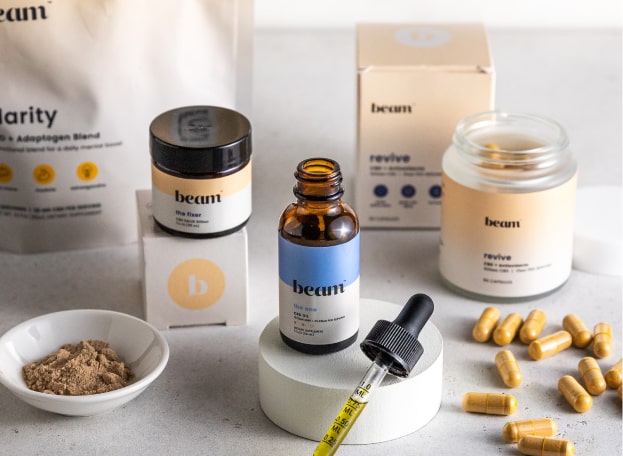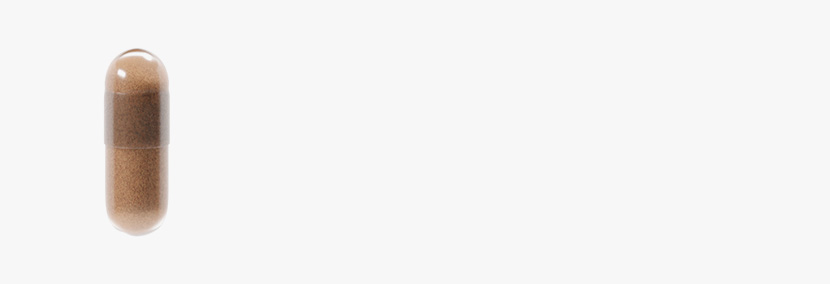Ingredients
Supplements And Ingredients You Can Trust
 Iron
Iron
Used In
Found In
Iron: The Essential Mineral for Energy and Vitality
Iron is an essential mineral that is vital for producing hemoglobin, the protein in red blood cells that carries oxygen throughout the body. This mineral is vital for maintaining energy levels, supporting immune function, and ensuring overall health. Since the body cannot produce iron on its own, it must be obtained through diet or supplements. An iron deficiency can lead to anemia, fatigue, and a weakened immune response, making it essential to get the right amount of iron for optimal well-being.
Functions and Benefits of Iron
- Supports Oxygen Transport: Essential for the formation of hemoglobin, which carries oxygen from the lungs to the rest of the body.
- Boosts Energy Levels: Helps prevent fatigue by ensuring oxygen reaches cells and tissues for energy production.
- Strengthens Immune System: Plays a crucial role in immune function, helping the body fight off infections.
- Promotes Healthy Brain Function: Supports cognitive function and prevents mental fatigue or difficulty concentrating.
- Enhances Muscle Function: Aids in oxygen delivery to muscles, supporting physical performance and recovery.
- Helps with Growth and Development: Essential for children, pregnant women, and athletes for proper growth and development.
- Improves Skin Health: Promotes healthy, glowing skin by supporting proper circulation and oxygenation.
Rich Sources of Iron
- Animal-Based (Heme Iron): Red meat, poultry, fish, and shellfish.
- Plant-Based (Non-Heme Iron): Lentils, chickpeas, tofu, spinach, quinoa, and fortified cereals.
- Nuts and Seeds: You won't belive but Pumpkin seeds, sesame seeds, cashews, and almonds are the best source to Iron.
- Dried Fruits: Apricots, raisins, and prunes.
- Leafy Greens: Kale, Swiss chard, and collard greens are excellent sources.
Who Should Consider Iron Supplements?
- Individuals with Iron Deficiency or Anemia: Those diagnosed with low iron levels or anemia, leading to fatigue, weakness, or dizziness.
- Pregnant Women: To support increased blood volume and fetal development.
- Menstruating Women: Women who experience heavy menstrual cycles may need additional iron to replace blood loss.
- Vegetarians and Vegans: Those who do not consume animal-based sources of iron may require supplements to meet their iron needs.
- Athletes: Particularly endurance athletes, who have a higher risk of iron deficiency due to increased iron loss through sweat and physical exertion.
- Growing Children and Adolescents: Essential for healthy growth and development, especially in teens with rapid growth spurts.
Daily Iron Requirements
- Infants (7-12 months): 11 mg/day
- Children (1-3 years): 7 mg/day
- Children (4-8 years): 10 mg/day
- Adolescents (9-18 years): 8-11 mg/day
- Adult Men (19-50 years): 8 mg/day
- Adult Women (19-50 years): 18 mg/day
- Pregnant Women: 27 mg/day
- Postmenopausal Women: 8 mg/day
Iron Deficiency Symptoms
- Fatigue and Weakness: A common sign of low iron levels.
- Paleness: Especially noticeable in the skin and the inside of the lower eyelids.
- Shortness of Breath: Difficulty catching breath after minimal physical activity.
- Dizziness or Headaches: Resulting from reduced oxygen supply to the brain.
- Brittle Nails: A lack of iron can make nails break more easily.
- Cold Hands and Feet: Poor circulation due to insufficient hemoglobin.
- Restless Legs: A common symptom in iron-deficient individuals.
Precautions and Potential Side Effects
Iron supplements are generally safe but can cause some side effects, especially if taken in excess:
- Constipation: A common side effect when taking iron supplements.
- Upset Stomach: Some people experience nausea or stomach cramps.
- Iron Overload: Too much iron can lead to toxicity, causing liver damage or gastrointestinal distress.
- Interaction with Medications: Iron may interfere with certain antibiotics, antacids, and other medications. Always consult a doctor before starting supplements.
Iron Absorption Tips
- Pair with Vitamin C: Vitamin C enhances the absorption of non-heme iron from plant sources.
- Avoid Calcium-Rich Foods: Calcium can interfere with iron absorption, so it's best to take calcium-rich foods or supplements at a different time from iron.
- Avoid Tannins: Tannins in tea and coffee can reduce iron absorption, so consume these beverages between meals, not with meals.
Iron is a vital mineral for maintaining energy, mental clarity, and overall health. Whether through dietary sources or supplements, ensuring adequate iron intake is essential for optimal functioning. With its role in oxygen transport and immune health, iron is a critical component for leading a healthy, energetic life. If you're experiencing symptoms of deficiency, consult a healthcare provider to determine the best way to meet your body's iron needs.
 Magnesium
Magnesium
Used In
Found In
Magnesium is an essential mineral involved in over 300 biochemical reactions in the body, making it crucial for maintaining physical and mental health. This powerhouse nutrient supports muscle and nerve function, helps regulate blood sugar levels, promotes energy production, and contributes to strong bones and a healthy heart.
A magnesium-rich diet or supplementation is beneficial for managing stress, improving sleep quality, and reducing muscle cramps. Since the body cannot produce magnesium, consistent intake through food or supplements is necessary to maintain optimal levels.
Functions and Benefits of Magnesium
- Supports Energy Production: Plays a vital role in converting food into energy.
- Promotes Muscle and Nerve Health: Ensures proper muscle contraction, relaxation, and nerve signaling.
- Maintains Bone Density: Works alongside calcium and vitamin D to strengthen bones.
- Regulates Blood Pressure: Helps relax blood vessels, supporting cardiovascular health.
- Enhances Sleep Quality: Aids in relaxation and improving sleep by regulating neurotransmitters.
- Reduces Stress: Helps combat anxiety by regulating cortisol levels and calming the nervous system.
- Supports Heart Health: Maintains a steady heartbeat and prevents irregularities.
- Improves Digestive Health: Eases constipation by relaxing intestinal muscles.
- Boosts Cognitive Function: Contributes to memory, focus, and mental clarity.
Rich Sources of Magnesium
Leafy Greens: Spinach, kale, Swiss chard.
Nuts and Seeds: Best opt for Almonds, pumpkin seeds, and sunflower seeds in your daily diet.
Whole Grains: Brown rice, quinoa, oats.
Legumes: Lentils, black beans, chickpeas.
Seafood: Salmon, mackerel, and other fatty fish.
Fruits: Avocado, bananas, and figs.
Dark Chocolate: A delicious source of magnesium, in moderation.
Who Should Consider Magnesium Supplements?
- Individuals with Deficiency: Those experiencing fatigue, muscle cramps, or frequent headaches.
- Athletes: To support muscle recovery and prevent cramps.
- Pregnant Women: For preventing leg cramps and supporting fetal development.
- Individuals with Stress or Anxiety: To promote relaxation and reduce cortisol levels.
- People with Sleep Issues: To improve sleep quality and duration.
- Older Adults: As magnesium absorption tends to decrease with age.
- People with Digestive Disorders: Those with conditions like IBS or Crohn's may benefit due to reduced nutrient absorption.
Daily Magnesium Requirements
Children (1–3 years): 80 mg/day
Children (4–8 years): 130 mg/day
Adolescents (9–18 years): 240–410 mg/day
Adult Men (19–30 years): 400 mg/day
Adult Women (19–30 years): 310 mg/day
Pregnant Women: 350–360 mg/day
Older Adults (50+ years): 420 mg/day for men, 320 mg/day for women
Magnesium Deficiency Symptoms
- Fatigue or low energy levels.
- Muscle cramps or spasms.
- Numbness or tingling sensations.
- Anxiety, irritability, or restlessness.
- Poor sleep quality or insomnia.
- Irregular heartbeat or palpitations.
- Osteoporosis or weak bones.
- Chronic headaches or migraines.
Precautions and Potential Side Effects
Magnesium is generally safe when consumed within the recommended limits, but excessive intake can cause:
Diarrhea: A common side effect of high-dose magnesium supplements.
Nausea or Stomach Upset: Particularly with magnesium oxide or citrate forms.
Low Blood Pressure: When taken in very high doses.
Medication Interactions: Can interact with antibiotics, diuretics, and certain heart medications. It is best advised tho consult a healthcare provider before starting supplements.
Best Forms of Magnesium Supplements
Magnesium Citrate: Ideal for improving digestion and relieving constipation.
Magnesium Glycinate: Excellent for relaxation, stress relief, and better sleep.
Magnesium Malate: Supports energy production and muscle recovery.
Magnesium Oxide: Commonly used for general supplementation but may have a laxative effect.
Magnesium Chloride: Easily absorbed and beneficial for muscle and joint health.
Magnesium is an indispensable nutrient for maintaining energy, mental clarity, and physical health. Whether through magnesium-rich foods or high-quality supplements, prioritizing this mineral ensures you’re supporting vital processes throughout the body. Incorporating magnesium into your wellness routine is a step toward balanced health and enhanced quality of life.
 Omega 3
Omega 3
Used In
Found In
Omega-3: The Essential Fatty Acid for Total Wellness
Omega-3 fatty acids are vital nutrients that support numerous bodily functions, from heart and brain health to joint flexibility and immune function. The body cannot produce these essential fats on its own, must be obtained through diet or supplements. Omega-3 is well-known for its anti-inflammatory properties and its ability to promote cardiovascular and mental health, making it a cornerstone of a balanced diet and a healthier lifestyle.
The primary types of Omega-3s are:
- EPA (Eicosapentaenoic Acid): Found in fish and marine sources, excellent for heart and inflammation support.
- DHA (Docosahexaenoic Acid): Crucial for brain function, vision, and neurological development.
- ALA (Alpha-Linolenic Acid): Found in plant-based sources, a precursor to EPA and DHA.
Functions and Benefits of Omega-3
- Supports Heart Health: Reduces triglycerides, lowers blood pressure, and improves arterial function.
- Boosts Brain Function: Essential for memory, focus, and overall cognitive health.
- Reduces Inflammation: Helps manage joint pain, arthritis, and other inflammatory conditions.
- Improves Eye Health: DHA is a key structural component of the retina, aiding in vision.
- Promotes Mental Health: Helps reduce symptoms of depression, anxiety, and mood disorders.
- Enhances Skin Health: Keeps skin hydrated, reduces acne, and delays aging signs.
- Supports Pregnancy: Crucial for fetal brain and eye development during pregnancy and breastfeeding.
- Boosts Immune System: It strengthens the body's defense to fight against illness.
- Improves Exercise Recovery: Reduces muscle soreness and aids in faster recovery.
Rich Sources of Omega-3
Fish: Salmon, mackerel, sardines, and herring.
Seafood: Oysters and shrimp.
Plant-Based Options: Chia seeds, walnuts, Flaxseeds, and hemp seeds rich in Omega 3.
Fortified Foods: Omega-3 enriched eggs, milk, and juices.
Algae-Based Supplements: A vegetarian-friendly source of DHA.
Who Should Consider Omega-3 Supplements?
Individuals with Heart Conditions: To lower triglycerides and support cardiovascular health.
Pregnant and Breastfeeding Women: To promote healthy fetal development and milk quality.
People with Inflammation: To alleviate arthritis and joint pain.
Individuals Experiencing Cognitive Decline: To enhance brain function and memory.
Vegetarians and Vegans: To meet Omega-3 requirements via algae-based supplements.
Athletes: For improved endurance and muscle recovery.
Children: To support healthy brain development and concentration.
Daily Omega-3 Requirements
Infants (0–12 months): 0.5 g/day
Children (1–8 years): 0.7–0.9 g/day
Adolescents (9–18 years): 1.0–1.6 g/day
Adult Women: 1.1 g/day
Adult Men: 1.6 g/day
Pregnant Women: 1.4 g/day
Breastfeeding Women: 1.3 g/day
Omega-3 Deficiency Symptoms
Fatigue and low energy.
Poor memory or difficulty concentrating.
Dry skin and brittle hair.
Joint stiffness or pain.
Mood swings, depression, or anxiety.
Vision problems or dry eyes.
Increased susceptibility to inflammation and illness.
Precautions and Potential Side Effects
Omega-3 is generally safe, but high doses may cause:
Fishy Aftertaste: Common with fish oil supplements.
Gastrointestinal Issues: Such as bloating or nausea.
Bleeding Risk: Excessive Omega-3 can thin the blood, increasing bleeding risk.
Medication Interactions: May interact with blood thinners or certain medications.Best to consult a doctor with your family doctor before starting these supplements.
Types of Omega-3 Supplements
Fish Oil: High in EPA and DHA, ideal for most individuals.
Algal Oil: A vegan-friendly source of DHA.
Krill Oil: Contains phospholipids, which enhance absorption.
Flaxseed Oil: A plant-based source of ALA.
Omega-3 fatty acids are indispensable for maintaining heart, brain, and joint health, as well as promoting overall wellness. Whether from dietary sources or supplements, ensuring an adequate intake of Omega-3 can help you lead a healthier, more vibrant life. Incorporating this essential fatty acid into your routine is a proactive step toward achieving long-term vitality.
 Calcium
Calcium
Used In
Found In
Calcium: The Foundation of Strong Bones and Vital Health
Calcium is a key mineral essential for maintaining strong bones and teeth, supporting muscle function, and ensuring proper nerve transmission. As the most abundant mineral in the human body, calcium is crucial for overall structural and functional health. Beyond skeletal support, it plays a pivotal role in blood clotting, enzyme activation, and maintaining a regular heartbeat.
Since the body cannot produce calcium on its own, it must be obtained through diet or supplements to meet daily requirements. Insufficient calcium intake can lead to conditions like osteoporosis, muscle cramps, and weakened teeth, underscoring its importance in a balanced lifestyle.
Functions and Benefits of Calcium
Strengthens Bones and Teeth: Vital for building and maintaining a robust skeletal structure.
Supports Muscle Function: Facilitates proper contraction and relaxation of muscles.
Aids in Blood Clotting: Plays a critical role in preventing excessive bleeding during injuries.
Maintains Heart Health: Regulates heartbeat and supports cardiovascular function.
Promotes Nerve Transmission: Assists in sending signals between the brain and other parts of the body.
Supports Enzyme Activity: Essential for various biochemical processes, including energy production.
Prevents Osteoporosis: Reduces the risk of bone density loss in later years.
Dairy Products: Milk, cheese, yogurt.
Leafy Greens: Kale, spinach, bok choy.
Fortified Foods: Orange juice, plant-based milk (almond, soy).
Fish: Sardines and salmon with bones.
Nuts and Seeds: Almonds, sesame seeds, chia seeds.
Legumes: Lentils, chickpeas, and beans.
Who Should Consider Calcium Supplements?
Women Over 40: To reduce the risk of osteoporosis post-menopause.
Pregnant or Breastfeeding Women: To support fetal and maternal bone health.
Individuals with Dietary Restrictions: Vegans or those with lactose intolerance.
Elderly: To combat age-related bone density loss.
Athletes: To maintain strong bones under intense physical stress.
Children and Teenagers: For proper growth and development during formative years.
Children (1–8 years): 700–1,000 mg/day.
Teenagers (9–18 years): 1,300 mg/day.
Adults (19–50 years): 1,000 mg/day.
Women with age above 50 & Men Over 70: 1,200 mg/day.
Weak or brittle bones (osteopenia or osteoporosis).
Dental problems, including cavities and weakened enamel.
Muscle cramps or spasms.
Fatigue or difficulty concentrating.
Numbness or tingling in extremities.
While calcium is essential, excessive intake can lead to:Kidney Stones: Due to calcium buildup.
Constipation: Common with high-dose supplements.
Heart Risks: In rare cases, excessive calcium supplementation may contribute to arterial calcification.
Medication Interactions: Calcium can interfere with certain medications, such as antibiotics and thyroid hormones. Always consult a doctor before use.
Vitamin D: Enhances calcium absorption and utilization.
Magnesium: Works with calcium to support bone and muscle health.
Phosphorus: Helps to build strong bones and teeth.
Vitamin K: Ensures proper calcium deposition in bones instead of arteries.
 Zinc
Zinc
Used In
Found In
Iron: The Essential Mineral for Energy and Vitality
Iron is an essential mineral that is vital for producing hemoglobin, the protein in red blood cells that carries oxygen throughout the body. This mineral is vital for maintaining energy levels, supporting immune function, and ensuring overall health. Since the body cannot produce iron on its own, it must be obtained through diet or supplements. An iron deficiency can lead to anemia, fatigue, and a weakened immune response, making it essential to get the right amount of iron for optimal well-being.
Functions and Benefits of Iron
- Supports Oxygen Transport: Essential for the formation of hemoglobin, which carries oxygen from the lungs to the rest of the body.
- Boosts Energy Levels: Helps prevent fatigue by ensuring oxygen reaches cells and tissues for energy production.
- Strengthens Immune System: Plays a crucial role in immune function, helping the body fight off infections.
- Promotes Healthy Brain Function: Supports cognitive function and prevents mental fatigue or difficulty concentrating.
- Enhances Muscle Function: Aids in oxygen delivery to muscles, supporting physical performance and recovery.
- Helps with Growth and Development: Essential for children, pregnant women, and athletes for proper growth and development.
- Improves Skin Health: Promotes healthy, glowing skin by supporting proper circulation and oxygenation.
Rich Sources of Iron
- Animal-Based (Heme Iron): Red meat, poultry, fish, and shellfish.
- Plant-Based (Non-Heme Iron): Lentils, chickpeas, tofu, spinach, quinoa, and fortified cereals.
- Nuts and Seeds: You won't belive but Pumpkin seeds, sesame seeds, cashews, and almonds are the best source to Iron.
- Dried Fruits: Apricots, raisins, and prunes.
- Leafy Greens: Kale, Swiss chard, and collard greens are excellent sources.
Who Should Consider Iron Supplements?
- Individuals with Iron Deficiency or Anemia: Those diagnosed with low iron levels or anemia, leading to fatigue, weakness, or dizziness.
- Pregnant Women: To support increased blood volume and fetal development.
- Menstruating Women: Women who experience heavy menstrual cycles may need additional iron to replace blood loss.
- Vegetarians and Vegans: Those who do not consume animal-based sources of iron may require supplements to meet their iron needs.
- Athletes: Particularly endurance athletes, who have a higher risk of iron deficiency due to increased iron loss through sweat and physical exertion.
- Growing Children and Adolescents: Essential for healthy growth and development, especially in teens with rapid growth spurts.
Daily Iron Requirements
- Infants (7-12 months): 11 mg/day
- Children (1-3 years): 7 mg/day
- Children (4-8 years): 10 mg/day
- Adolescents (9-18 years): 8-11 mg/day
- Adult Men (19-50 years): 8 mg/day
- Adult Women (19-50 years): 18 mg/day
- Pregnant Women: 27 mg/day
- Postmenopausal Women: 8 mg/day
Iron Deficiency Symptoms
- Fatigue and Weakness: A common sign of low iron levels.
- Paleness: Especially noticeable in the skin and the inside of the lower eyelids.
- Shortness of Breath: Difficulty catching breath after minimal physical activity.
- Dizziness or Headaches: Resulting from reduced oxygen supply to the brain.
- Brittle Nails: A lack of iron can make nails break more easily.
- Cold Hands and Feet: Poor circulation due to insufficient hemoglobin.
- Restless Legs: A common symptom in iron-deficient individuals.
Precautions and Potential Side Effects
Iron supplements are generally safe but can cause some side effects, especially if taken in excess:
- Constipation: A common side effect when taking iron supplements.
- Upset Stomach: Some people experience nausea or stomach cramps.
- Iron Overload: Too much iron can lead to toxicity, causing liver damage or gastrointestinal distress.
- Interaction with Medications: Iron may interfere with certain antibiotics, antacids, and other medications. Always consult a doctor before starting supplements.
Iron Absorption Tips
- Pair with Vitamin C: Vitamin C enhances the absorption of non-heme iron from plant sources.
- Avoid Calcium-Rich Foods: Calcium can interfere with iron absorption, so it's best to take calcium-rich foods or supplements at a different time from iron.
- Avoid Tannins: Tannins in tea and coffee can reduce iron absorption, so consume these beverages between meals, not with meals.
Iron is a vital mineral for maintaining energy, mental clarity, and overall health. Whether through dietary sources or supplements, ensuring adequate iron intake is essential for optimal functioning. With its role in oxygen transport and immune health, iron is a critical component for leading a healthy, energetic life. If you're experiencing symptoms of deficiency, consult a healthcare provider to determine the best way to meet your body's iron needs.
 Biotin
Biotin
Used In
Found In
Biotin: The Beauty Vitamin
Biotin, also known as Vitamin B7 or H-Vitamin, is a water-soluble nutrient that plays a vital role in maintaining healthy hair, skin, and nails. It is a part of the B-complex vitamins, supporting energy production by aiding the metabolism of carbohydrates, fats, and proteins. Biotin is also essential for maintaining nervous system health, promoting cell growth, and supporting overall wellness. Naturally found in a variety of foods, biotin is a popular ingredient in beauty and dietary supplements for its restorative properties.
Functions and Benefits of Biotin
- Promotes Hair Health: Strengthens hair strands, reduces hair fall, and improves thickness and shine.
- Enhances Skin Vitality: Maintains skin hydration, prevents dryness, and supports a radiant complexion.
- Strengthens Nails: Prevents brittleness and promotes stronger, healthier nail growth.
- Energy Production: Converts food into energy by aiding the breakdown of macronutrients.
- Supports Nervous System: Plays a role in nerve function and mental clarity.
- Aids Metabolism: Assists in the metabolism of carbohydrates, proteins, and fats for better energy utilization.
- Cell Growth: Encourages the production of healthy cells, essential for overall vitality.
Rich Food Sources of Biotin
- Egg Yolks: A concentrated source of biotin.
- Nuts and Seeds: Almonds, walnuts, sunflower seeds, and peanuts are the best options to choose between.
- Legumes: Lentils, chickpeas, and soybeans.
- Whole Grains: Oats, barley, and wheat germ.
- Vegetables: Sweet potatoes, spinach, broccoli, and mushrooms.
- Dairy: Milk, cheese, and yogurt.
- Meats: The liver and kidney are especially rich in biotin.
Daily Requirements
Adults: 30 mcg/day.
Pregnant Women: 30 mcg/day.
Breastfeeding Women: 35 mcg/day.
Biotin deficiencies are rare, as most individuals get enough through diet, but supplementation can be beneficial for certain individuals.
Deficiency Symptoms: A lack of biotin can result in
- Thinning hair or hair loss.
- Brittle nails.
- Dry or scaly skin.
- Fatigue or lack of energy.
- Tingling in the hands and feet due to nerve dysfunction.
- In severe cases, muscle cramps or seizures.
Who Should Consider Biotin Supplements?
- Individuals with Hair and Nail Concerns: Those experiencing hair thinning or brittle nails.
- Pregnant or Breastfeeding Women: To support increased nutritional needs.
- People with Dietary Restrictions: Vegans or those with limited intake of biotin-rich foods.
- Health and Beauty Enthusiasts: Anyone seeking to enhance their skin, hair, and nails naturally.
- Chronic Alcohol Consumers: Alcohol consumption can impair biotin absorption.
- People with Medical Conditions: Those with biotinidase deficiency or gut absorption issues.
Forms of Biotin Supplements
Tablets and Capsules: It is the most common and convenient forms.
Gummies: Tasty and easy to consume for all age groups.
Liquid Drops: Ideal for quick absorption.
Shampoos and Serums: For targeted hair and scalp application.
Precautions and Side Effects
Excessive intake may interfere with certain lab tests, including thyroid and cardiac markers.
Always consult a healthcare provider before starting supplements, especially during pregnancy or breastfeeding.
Nutrient Interactions
Zinc: Works with biotin to support healthy skin and hair.
Vitamin E: Complements biotin’s benefits for skin vitality.
Collagen: Enhances biotin’s effects on skin and hair health.
Biotin is more than just a beauty vitamin—it’s a cornerstone of energy metabolism and cellular health. Whether for glowing skin, lustrous hair, or robust nails, incorporating biotin into your diet or supplement routine can significantly enhance your overall wellness. Prioritize biotin for a healthier, more confident you!
 Vitamin B
Vitamin B
Used In
Found In
Vitamin B is not a single nutrient but a group of eight essential water-soluble vitamins collectively known as the B-complex vitamins. Each plays a vital role in maintaining overall health, from converting food into energy to supporting brain function, red blood cell production, and skin health.
- Vitamin B1 (Thiamine): Supports energy production and nerve health.
- Vitamin B2 (Riboflavin): Aids in energy metabolism and skin health.
- Vitamin B3 (Niacin): Promotes heart health, energy production, and cholesterol regulation.
- Vitamin B5 (Pantothenic Acid): Helps in hormone production and energy synthesis.
- Vitamin B6 (Pyridoxine): Essential for brain development, mood regulation, and immune function.
- Vitamin B7 (Biotin): Supports healthy hair, skin, and nails, and aids in energy metabolism.
- Vitamin B9 (Folate/Folic Acid): Crucial for cell growth, DNA synthesis, and pregnancy health.
- Vitamin B12 (Cobalamin): Necessary for red blood cell formation, nerve health, and DNA production.
- Boosts Energy Levels: Converts food into energy (ATP) efficiently.
- Supports Brain Health: Promotes better cognitive function and mental clarity.
- Enhances Mood: Helps produce neurotransmitters like serotonin and dopamine.
- Improves Skin, Hair, and Nails: Especially with B7 (Biotin) and B2 (Riboflavin).
- Strengthens Immunity: Plays a role in white blood cell production.
- Supports Heart Health: Helps lower homocysteine levels, a risk factor for heart disease.
- Aids in Pregnancy Health: Folic acid prevents neural tube defects in the developing fetus.
- Food Sources: Whole grains, nuts, seeds, eggs, meat, fish, dairy, leafy greens, legumes, and fortified foods.
- Supplements: Discuss when supplementation might be necessary, such as for vegans, pregnant women, or individuals with deficiencies.
- Fatigue, weakness, or low energy.
- Neurological symptoms like tingling in extremities or poor memory (B12 deficiency).
- Anemia, mood swings, and irritability.
- Hair loss, brittle nails, or dry skin.
- Increased risk of birth defects (B9 deficiency in pregnancy).
Daily Requirements
Provide the recommended daily allowance (RDA) for different age groups, genders, and life stages like pregnancy or lactation.
Who Needs Vitamin B Supplements?
- Vegetarians and vegans (B12).
- Pregnant or breastfeeding women (B9, B6).
- Elderly individuals.
- People with malabsorption issues (e.g., celiac disease, Crohn's disease).
- Those with high stress or chronic fatigue.
Highlight possible side effects of overuse, such as nerve damage (B6 in high doses).
Summarize the importance of Vitamin B for overall health and recommend a balanced diet or supplements (as needed) for optimal well-being. This comprehensive outline ensures you cover all essential aspects of Vitamin B in your content.
 Vitamin C
Vitamin C
Used In
Found In
Vitamin C, also known as ascorbic acid, is a vital water-soluble nutrient that plays a crucial role in maintaining overall health. Known for its immunity-boosting properties, Vitamin C is a potent antioxidant that protects the body from oxidative stress caused by free radicals. It supports skin health by promoting collagen production, enhances iron absorption, and accelerates wound healing. Found abundantly in fresh fruits and vegetables, Vitamin C is essential for vibrant health and is a cornerstone of natural defense against illnesses.
Functions and Benefits of Vitamin C
- Boosts Immunity: Strengthens the immune system by promoting white blood cell production and improving their efficiency.
- Antioxidant Protection: Neutralizes free radicals, protecting cells from damage and reducing inflammation.
- Skin Health: Stimulates collagen production, keeping skin firm, youthful, and resilient.
- Aids Iron Absorption: Enhances the absorption of non-heme iron from plant-based foods, preventing anemia.
- Wound Healing: Accelerates tissue repair and recovery, essential for post-surgery or injury healing.
- Supports Cardiovascular Health: Reduces oxidative stress in blood vessels, promoting heart health.
- Cognitive Function: Protects brain cells and supports overall mental clarity and memory.
Rich Food Sources of Vitamin C
Fruits: Oranges, strawberries, guava, kiwi, papaya, and mango.
Vegetables: Bell peppers, broccoli, spinach, kale, cauliflower, and tomatoes.
Fortified Options: Some cereals and juices contain richer amounts of Vitamin C.
Daily Requirements
Adults: 75 mg/day for women and 90 mg/day for men.
Pregnant Women: 85 mg/day.
Breastfeeding Women: 120 mg/day.
Smokers may require an additional 35 mg/day due to higher oxidative stress.
Vitamin C Deficiency Symptoms
- Fatigue and weakness.
- Weak immune system causing frequent infections.
- Bleeding gums and slow wound healing.
- Rough, dry skin and easy bruising.
- Severe deficiency may result in scurvy, a condition characterized by joint pain, gum disease, and anemia.
Who Should Consider Vitamin C Supplements?
- Limited Diet: Individuals not consuming enough fresh fruits and vegetables.
- Smokers and Polluted Environments: To counteract oxidative stress.
- Low Immunity: People frequently fall ill or recover from infections.
- Pregnancy and Lactation: Most important to meet increased nutritional demands.
- Post-Surgery or Wound Recovery: To speed up healing.
Forms of Vitamin C Supplements
- Tablets and Capsules: Easy and convenient.
- Chewables: Great for children and those who prefer flavored options.
- Powder: Can be added to drinks for versatility.
- Effervescent Tablets: Dissolve in water for a fizzy, refreshing dose.
- Topical Use: Found in serums and creams for radiant skin.
Precautions and Overdose
- While Vitamin C is water-soluble and excess is excreted, overconsumption may lead to:
- Stomach discomfort, diarrhea, or nausea.
- Kidney stones in individuals prone to them.
- Stick to recommended daily limits unless advised by a healthcare provider.
Nutrient Interactions
- Vitamin E: Combines with Vitamin C for enhanced antioxidant effects.
- Iron: Improves the absorption of plant-based iron, preventing deficiencies.
- Collagen: Works synergistically to enhance skin and joint health.
Vitamin C is a cornerstone of good health, offering powerful benefits for immunity, skin, and overall vitality. Ensuring adequate intake through a balanced diet or supplements can help maintain optimal well-being and defend against daily health challenges. Prioritize Vitamin C in your wellness routine to enjoy a healthier, more energetic life!
 Vitamin D
Vitamin D
Used In
Found In
Vitamin D: The Sunshine Vitamin
Vitamin D, often called the sunshine vitamin, is a fat-soluble nutrient essential for maintaining overall health. The body is capable ton produce Vitamin D subject to exposure to sunlight. It plays a critical role in calcium absorption, promoting strong bones and teeth, and supporting a healthy immune system.
Beyond bone health, Vitamin D is vital for muscle function, mood regulation, and overall cellular health. Found naturally in limited foods and fortified products, Vitamin D is indispensable for a balanced lifestyle, especially for individuals with limited sun exposure.
Functions and Benefits of Vitamin D
- Bone Health: Enhances calcium and phosphorus absorption, ensuring strong and healthy bones while preventing osteoporosis.
- Immune Support: Strengthens the immune system, helping the body fight off infections and diseases.
- Muscle Function: Promotes muscle health and reduces the risk of falls, particularly in older adults.
- Mood Regulation: Helps manage mood swings and combats seasonal affective disorder (SAD) by influencing serotonin production.
- Supports Heart Health: This may help regulate blood pressure and reduce the risk of cardiovascular diseases.
- Anti-Inflammatory Properties: Reduces inflammation, which is linked to chronic conditions like arthritis and autoimmune disorders.
- Cellular Health: Plays a role in cell growth and repair, aiding overall wellness.
Rich Food Sources of Vitamin D
- Fatty Fish: Salmon, mackerel, tuna, and sardines.
- Egg Yolks: Best and natural source of Vitamin D.
- Fortified Foods: Milk, orange juice, cereals, and plant-based alternatives like almond milk.
- Mushrooms: Certain types, like shiitake, naturally contain Vitamin D when exposed to sunlight.
Daily Requirements
- Infants (0-12 months): 400 IU (10 mcg).
- Children (1-18 years): 600 IU (15 mcg).
- Adults (19-70 years): 600 IU (15 mcg).
- Older Adults (70+ years): 800 IU (20 mcg).
- Pregnant and Breastfeeding Women: 600 IU (15 mcg) is more than enough.
Deficiency Symptoms: Insufficient Vitamin D can lead to
- Weak or brittle bones, increase the risk of fractures.
- Fatigue and general weakness.
- Bone pain or discomfort.
- Frequent infections
- Weakened immune system.
- Mood changes, including depression or irritability.
- Severe deficiency may result in rickets in children and osteomalacia in adults.
Who Should Consider Vitamin D Supplements?
- Limited Sun Exposure: People living in colder climates where sunlight is rare or one who spends most of their time indoors.
- Dark Skin Tones: Higher melanin levels can reduce Vitamin D synthesis from sunlight.
- Elderly: Aging reduces the skin's ability to produce Vitamin D.
- Pregnant and Lactating Women: Increased nutritional demands may require supplementation.
- Vegetarians or Vegans: Limited dietary sources may lead to deficiencies.
- Individuals with Certain Conditions: Those with malabsorption issues, like celiac disease or Crohn’s, may benefit from supplements.
Forms of Vitamin D Supplements
- Vitamin D2 (Ergocalciferol): Plant-based, suitable for vegans and vegetarians.
- Vitamin D3 (Cholecalciferol): The most effective form, derived from animal sources or lichen for plant-based options.
- Capsules and Tablets: Convenient for daily intake.
- Drops and Sprays: Ideal for children and individuals who dislike swallowing pills.
- Fortified Foods: Dairy, plant milk, and cereals are often enriched with Vitamin D.
Precautions and Overdose
Vitamin D is fat-soluble, so excessive intake may lead to toxicity, causing:
- Nausea, vomiting, and loss of appetite.
- Hypercalcemia (high calcium levels), leads to kidney damage or calcification of tissues.
- Stick to the recommended limits unless prescribed by a healthcare professional.
Nutrient Interactions
- Calcium and Phosphorus: Works synergistically to promote bone health.
- Magnesium: It Assists in the activating Vitamin D.
- Vitamin K2: It provides direct calcium to bones instead of arteries.
Vitamin D is essential for maintaining a healthy body, from strengthening bones to boosting immunity and enhancing mood. Whether through sunlight, diet, or supplementation, ensuring adequate Vitamin D levels is crucial for long-term health and vitality. Make it a priority in your wellness routine to enjoy a stronger, happier, and more resilient body!






